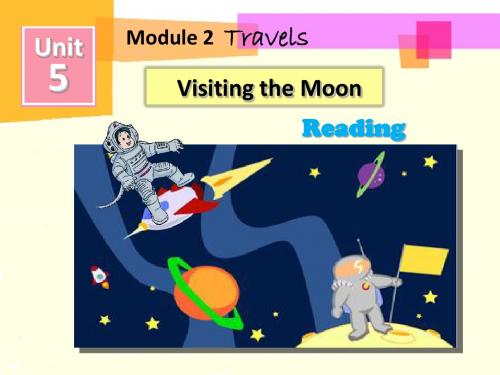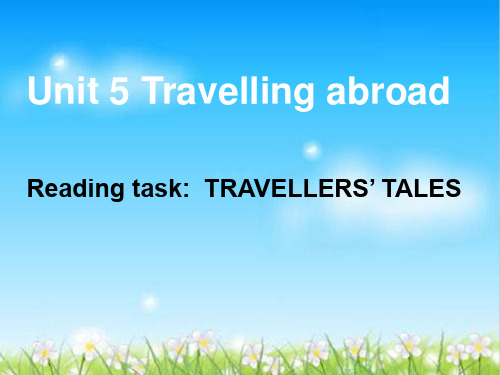Unit 5 Reading
- 格式:ppt
- 大小:4.01 MB
- 文档页数:27


人教版九年级英语Unit 5 reading教学设计Unit 5 What are the shirts made of? Section B 2a-2e【教材分析】本节课是人教版《Go for it》九年级第五单元的第四课时,课型为阅读课。
旨在培养学生阅读能力的同时介绍最具中国特色的传统艺术,如孔明灯、剪纸和泥塑,包括它们的制作工艺、制作原料和象征意义等。
通过本节课,还训练学生一个重要的阅读策略,即让学生了解文章结构的特点之一—先总体介绍,后细节描写。
【学情分析】九年级的学生已经有了一定的语言基础和阅读能力。
但很多学生缺乏阅读的兴趣和坚持下去的耐心,我们在教学中要设计不同形式和层次的任务,来培养他们的兴趣和语言、阅读能力。
学生对于本节课中所涉及的传统艺术较为熟悉,对于这些传统艺术的制作材料以及用途也不陌生。
本篇文章可以拓展学生的知识面,提升民族自豪高,对学生跨文化交际有潜移默化的作用【教学目标】语言能力:围绕中国传统艺术的话题,深入感知一般现在时的被动语态句型,通过阅读文章首段的大致介绍和插图,能够把握文章整体结构和段落大意。
能够运用一系列阅读技巧有效提高阅读技能,了解文章结构特点。
文化意识:能够通过对文章标题“Beauty in Common Things” 的思考,能够发现生活中更多的美好事物,重视中国传统或民间艺术,坚定文化自信心。
通过了解一些地方知名产品或传统艺术品的制作过程以及制作材料,感受中国文化和中国精神。
培养学生的民族自豪感及爱国主义精神。
思维品质:通过速读,扫读,跳读,课文复述等方式,增强对文章的理解和分析能力,提升思维能力的逻辑性,批判性和创新性。
学习能力:通过阅读有关中国传统艺术的文章,保持学习英语的兴趣,通过阅读策略的训练和学习,增强阅读理解能力。
【教学重难点】教学重点:1.本节课的重点词汇2.通过预测,快速浏览,以及提取细节信息的活动,学生能掌握文章结构的特点教学难点:掌握被动语态的用法和功能。


Unit5 Reading长难句型精析1. the+序数词(+名词)+to dothe+序数词或由the+序数词修饰的名词后要用不定式作定语。
the+序数词、the last、the only、the next等或被这些所修饰的名词或代词后常用不定式作定语。
教材原文He was the first man to land on the moon in July 1969.1969年7月他是第一个登上月球的人。
本句中的不定式短语to land on the moon 作后置定语,修饰the first man。
经典例句①He was the first guest to arrive.他是第一个到达的客人。
②She was the only one to survive the air crash.她是这次空难中唯一的幸存者。
③Miss Brown was the next to rise to speak.布朗小姐是下一个站起来发言的人。
即时训练1完成句子1. 他是第二个听到这个消息的人。
He was the second person_____________.2. 我们正在寻找一个住的地方。
We are looking for somewhere______________.3. 他能和别人友好相处是他主要的优点。
His ability others______________ is his chief advantage.参考答案:1. to hear the news2. to live3. to get along/on well with2. 无生命名词作主语的拟人用法表示时间、地点或其他无生命的名词作主语,谓语动词是see、find 或witness 等词时,是一种拟人手法,用来增加语言色彩,意为“(在某段时期或某地)发生(某情况)”。
教材原文The last thirty years have seen the greatest number of laws stopping our rights and progress, until today we have reached a stage where we have almost no rights at all. 过去30年来所出现的大量法律剥夺我们的权利,阻挡我们的进步,一直到今天,我们还处于几乎什么权利都没有的阶段。

Unit5 Reading 教学设计1.Teaching Analysis 教情分析1) Teaching objectives-教学目标①Language objectives-语言目标a. Key words & expressions 重点词汇和短语For applying: musician, pretend, attach, form, earn, extra, broadcast, humorous, attractive, dream of, to be honest, play jokes on, get familiar with, or so, break up.For comprehending: jazz, choral, folk, rock’n’roll, in front of, rely on, a big hit.For recognizing: determined, intelligent, classical.b. Sentence structuresHave you ever dreamed of playing in front of thousands of people at a concert, at which everyone is clapping and appreciating your music?They may start as a group of high-school students, for whom practising their music in someone’s house is the first step to fa me.Later they may give performances in pubs or clubs, for which they are paid in cash.However, after a year or so in which they became more serious about their work, the Monkees started to play and sing their own songs like a real band.The musicians were to play jokes on each other as well as play music, most of which was based loosely on the Beatles.However, after a year or so in which they became more serious about their work .They produced a new record in 1996, with which they celebrated their former time as a real band.② Ability goals 能力目标a. Enable the students to understand the details about the passage, and join the correct parts of the sentences together in Exercise 1. (page 35)b.Enable the students to sum up the main idea of each paragraph.(page 35)③Emotion goals情感目标a. Enable the Ss to have a general idea about how a band to be famous.b. Enable the Ss to appreciate and have a basic knowledge of different kinds ofmusic.2) Important & difficult teaching points-教学重难点① Important teaching points-教学重点Control the main ideas and details of the passage.② Difficult teaching points-教学难点Understand some attributive clauses with prep.+which/whom.2. Students analysis学情分析1) Fundamental state基本情况音乐,是学生比较感兴趣的话题,尤其是rap和pop,但是对于classical music 以及folk music,同学们可能有些陌生;教师需要根据学生的情绪,进行适当的引导,让同学们对不同种类的音乐都有所了解,甚至有自己个性化的理解。

Unit 5 Art worldReading1.Each time a medal was presented to a winner at the Beijing 2008 Olympic,the award music was played.(1) each time:每次,每逢,每当;其是一个连词词组,引导时间状语从句,如: I'll think of it each time I listen to music.我每次听音乐,都会想到它。
练习:(1)每当我听到这段音乐,就会想起那段时光。
__________ __________ I hear the music.I __________ _________my life during that time. Each time think of2. When he was very young, Tan showed an interest in music. He loves the sounds of the rushing water and blowing wind because, to him, the best music comes from nature.(1) show an interest in的含义:对,感(表现出)兴趣;对....产生(或表示)兴趣;如: My son is already(2) rushing water和blowing wind的结构:现在分词用作定语,修饰名词。
(3) to him的含义:对于他来说练习:(1) Your idea sounds ___________,but I don't have any ________ in it.A. interested; interestB. interesting; interestC. interesting; interested D interested; interesting(2)I have _____________to tell you. Maybe you will be __________ in it.A interesting something; interestedB something interesting; interestingC. something interesting; interested D interesting something; interested(3)Mr Brown always makes his class ________ and keeps his students ________ in class.A. alive: interesting B lively; interesting C. alive: interested D. lively; interested(4) The story is ______ and all of us are ________ in it.A. interest; interesting B interesting ; interestC interested; interesting D. interesting;interested(5)你什么时候开始表现出对音乐的兴趣?When did you __________________________________________________music?BCDD show an interest in3. Since he had no musical instruments then, he made music with common objects like stones and paper. Eight years later, he went on to study in the USA. There he got to know great musicians from around the world.练习:(1) Mark needs to learn Chinese ___________ his company is opening a branch in Beijing.A unlessB until C. although D. since(2)I have heard a lot of good things about you __________ I came back from abroad.A. since B until C before D.when(3) After finishing his homework he went on __________ a letter to his parents.A. write B writing C wrote D. to write(4)We __________ each other since 2010.A have got to knowB got to knowC knewD have knownDADD1.Instead, Tan makes over 50 sounds from water by controlling the speed of water flow.(1)instead的用法:【注意】区分instead和instead of:①instead副词,单独使用。